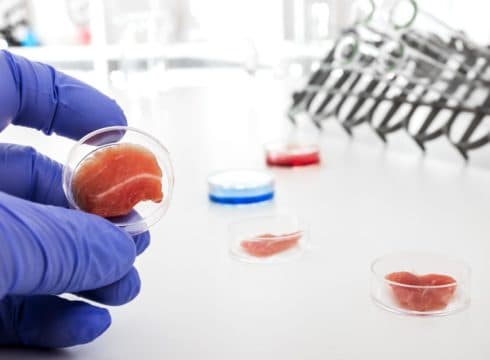The research was conducted to find alternatives to traditional animal-based protein
Besides being eco-friendly and cruelty-free, lab-grown meat can be customised for nutrition and allergies
Researchers are also trying to grow fat cells, cartilage cells and bone cells in conjunction with the muscle protein
Inc42 Daily Brief
Stay Ahead With Daily News & Analysis on India’s Tech & Startup Economy
Good news for non-vegetarians who are constantly looking out for cruelty-free food sources — researchers at IIT-Guwahati have recently developed lab-grown meat as an alternative to traditional meat. Apart from being environment-friendly and cruelty-free, lab-grown meat such as the ones produced at the IIT are also totally customisable since they are ‘bred’ using tissue culture.
Alternatives to conventional animal-based protein have become all the rage around the world with the likes of Impossible Foods and Beyond Meat. This particular variety was developed in the biomaterial and tissue engineering laboratory at the institute.
According to the researchers, the final meat product can be infused with nutritional values as per customer needs, and without compromising the taste of the final product. Dr Biman B Mandal of IIT-Guwahati said: “Usage of external chemicals like hormones, animal serum, growth factors or antibiotics have been restricted in this preparation, hence it is safe on ethical concerns.”
Customisable Lab-Grown Meat
Dr Mandal explained that muscle progenitor cells, which were taken from animals via small biopsies, were grown on an edible material substrate or base. And this novel technique has been patented by the team. The researchers are also trying to grow fat cells, cartilage cells and bone cells in conjunction with the muscle stem cells in different layers. “These tissue engineered meat are being cultured and grown in inexpensive culture media recently developed and patented in our laboratory,” added Dr Mandal.
The most fascinating aspect of the product is how the meat can be made lean or fatty by manipulating the production method. The lab-grown meat can also be converted into solid dry meat products in various shapes and sizes. “Daily edible components are being used to make the support matrix in order to increase the nutrient content of the meat product,” added the researcher.
Not only is the final product ethical and cruelty-free, it can also be preserved for future use in various shapes and sizes with the edible components through printing on a 3D bioprinter. The ultimate goal is to have bioreactors produce this product at a much larger scale, according to Dr Mandal.
Will India Adopt Lab-Grown Meat?
For Indian biotechnology and foodtech startups, research in these areas can be the dawn of a brave new world of innovation in the food sector. In fact, startups need to look at leveraging such research and bringing it to market with their business acumen. There’s not much private innovation happening in this space among Indian startups as the research itself is highly cost-intensive. Which is why the need of the hour for startups looking to disrupt this space is to tie-up with academia and public-sector research labs to find ways to bring new-age food to the market.
The meat industry is under immense pressure to change the age-old animal husbandry practices especially as population spirals out of control and the environmental impact of meat farming contributes to global warming. Outside a minority of farmers who are using cruelty-free methods to rear livestock and poultry, the meat industry is known to treat animals in an extremely cruel way, and billions of animals are killed each year to keep up with the pressure of food requirements for the growing population.
Moreover, according to media reports, around 4,000 litres of water are required to produce one kilogram of chicken, while the requirement is even higher in case of bigger animals — more than 8,000 litres of water are required to produce one kilogram of mutton.
The damage doesn’t end here. The livestock industry is responsible for wasting potable water, unchecked emission of greenhouse gases such as methane and carbon dioxide, and it is estimated that its carbon footprint is wider than all of the world’s transportation combined.
Plus, there’s the economic factor as well. Rearing livestock is an expensive proposition, whereas manufacturing of lab-grown meat would be akin to mass production. Dr Mandal said that lab-grown meat will be immensely beneficial in the Indian context, as it can be produced in bulk at a reasonable cost, and is also nutritious at the same time.
But the big question around meat alternatives which are bred in the lab is whether it will have lasting effects in the long run on human physiology. Since it’s such a novel concept, scientific testing about the impact on humans over decades is not yet possible with lab-grown meats, and in a country like India, with its various ideologies and the controversy around food lately, the concept may still be a few years away.
{{#name}}{{name}}{{/name}}{{^name}}-{{/name}}
{{#description}}{{description}}...{{/description}}{{^description}}-{{/description}}
Note: We at Inc42 take our ethics very seriously. More information about it can be found here.


